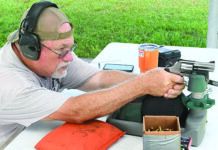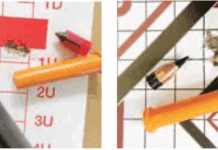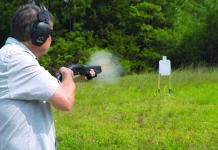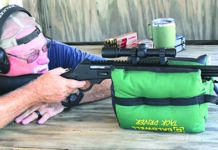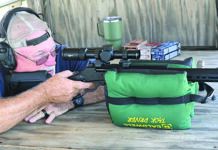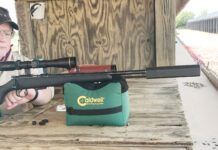The federal government has agreed to a joint dismissal of the government’s appeal in the Mock v. Bondi lawsuit, an action that effectively kills the Biden ATF’s “pistol brace” ban rule.
“Today is a great day for freedom and the American people,” said Firearms Policy Coalition (FPC) President Brandon Combs on July 17, the day of the dismissal was filed. “The dismissal of this appeal should be the final nail in the coffin of this unconstitutional Biden ATF assault on gun owners. As we explained in the case filings, braced pistols are not short-barreled rifles.”
United States District Court Judge Reed O’Connor originally vacated the ATF’s “pistol brace” ban rule in what was then called Mock v. Garland. The case was decided June 13, 2024, in the Northern District of Texas.
The lead plaintiff was William T. Mock. Christopher Lewis was another individual plaintiff. Maxim Defense Industries, LLC, and the Firearms Policy Coalition were also named as plaintiffs. Maxim Defense is a firearms and accessory manufacturer based in St. Cloud, Minnesota. FPC is a 2nd Amendment advocacy group based in Las Vegas.
According to the appeal brief, William Mock and Christopher Lewis are Texas residents who own at least one braced pistol and would purchase more if not for ATF’s brace rule. Mock, Lewis, and Maxim Defense are members of the Firearms Policy Coalition.
Defendants were U.S. Attorney General Pamela Bondi and Acting ATF Directer Kash Patel. By agreeing not to pursue its appeal in court, Bondi’s office agreed to end the pistol brace ban.
“The government is finally retreating from the Biden Administration’s patently unlawful effort to turn millions of peaceable people into felons by decree,” said FPC Action Foundation President Cody J. Wisniewski, an attorney for the challengers. “This horrible rule was a perversion of our system of limited government, so we’re glad to see this case resolved in favor of liberty and the rule of law.”
“This is a clear-cut victory and monumental step in preserving gun rights for future generations and safeguarding the firearms ecosystem from regulatory overreach,” said David Farrell, a Maxim Defense vice president.
In January 2023, the ATF reclassified numerous brace-equipped pistols as short-barreled rifles (SBRs) under the National Firearms Act (NFA), mandating:
• Registration of braced pistols
• Submission of fingerprints and photographs
• Payment of a $200 tax stamp
• Potential criminal penalties for non-compliance
Legal challenges immediately arose in the lawsuit, initially named Mock v. Garland and later renamed Mock v. Bondi. Their arguments focused on violations of the Administrative Procedure Act (APA) and infringement upon Second Amendment rights.
According to the decision, the rule failed legally for several clear reasons:
• APA Violations: Courts determined that the final version of the rule deviated substantially from its original proposal, making it legally invalid.
• Second Amendment Rights: Judges agreed with plaintiffs that pistol braces are protected under constitutional law.
• ATF Authority Limits: The court found the ATF had improperly attempted to create law rather than interpret existing statutes, a power reserved only for Congress.
“Today is a great day for freedom and the American people,” read a statement from Firearms Policy Coalition President Brandon Combs following an agreement to dismiss the government’s appeal in the lawsuit challenging the rule enacted by the Bureau of Alcohol, Tobacco, Firearms and Explosives in 2023. “The dismissal of this appeal should be the final nail in the coffin of this unconstitutional Biden ATF assault on gun owners.”
The same year the rule was applied, a lawsuit had been brought against then-Attorney General Merrick Garland, the Justice Department, the ATF and its then-director Steven Dettelbach. The filing outlined how the rule gave owners the option to register their firearms, dispose of or destroy their brace, surrender it to the agency, or destroy their firearm.
In 2024, a preliminary injunction had been secured by the plaintiffs that was then challenged by the Biden admin’s DOJ before the keys to the White House were turned over.
David Farrell, vice president of co-plaintiff Maxim Defense, said, “This is a clear-cut victory and monumental step in preserving gun rights for future generations and safeguarding the firearms ecosystem from regulatory overreach. This important achievement is the result of tireless dedication from the entire litigation team, not to mention the many supporters who have stood with us every single day. When we fight boldly and stand united, freedom prevails.”
Joining in celebrating the outcome, the U.S. Concealed Carry Association posted, “ATF Pistol Brace Ban is Officially Dead! As of July 17, 2025, the government has formally dismissed its appeal, cementing the injunction and vacating the rule entirely.”
The National Association for Gun Rights likewise stated, “The pistol brace rule is finally dead. The federal government has agreed to dismiss its further appeal in the case that froze the Biden administration’s anti-2A ruling. This marks a major step toward reining in the previous administration’s assault on gun rights. Millions of these devices are lawfully owned, and those citizens should never have been threatened with becoming felons overnight.”
Click here and here to read our earlier coverage of the lawsuit.





